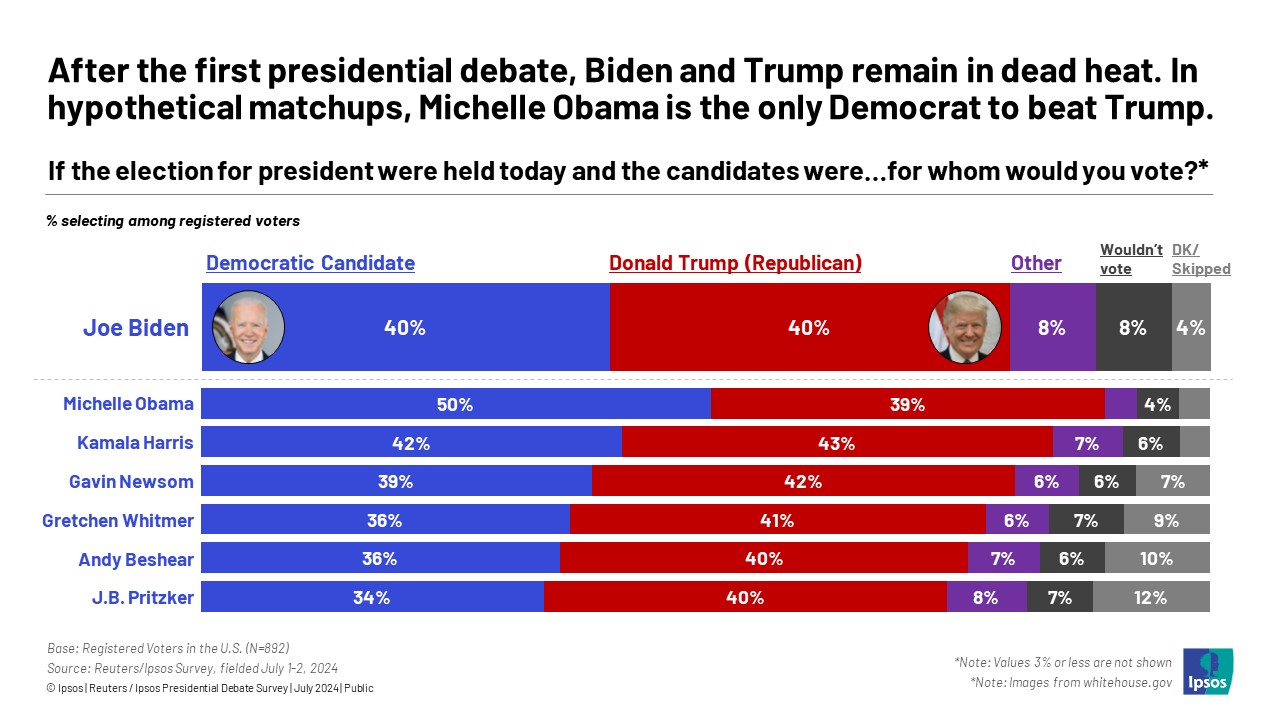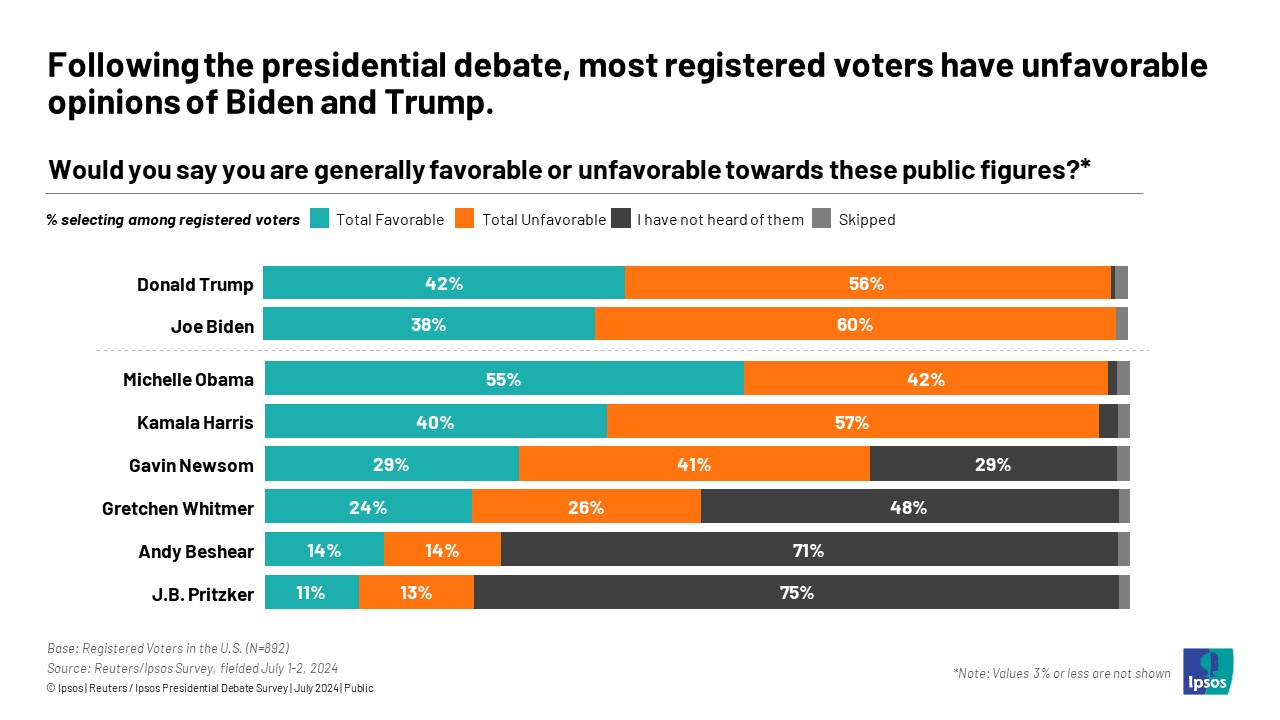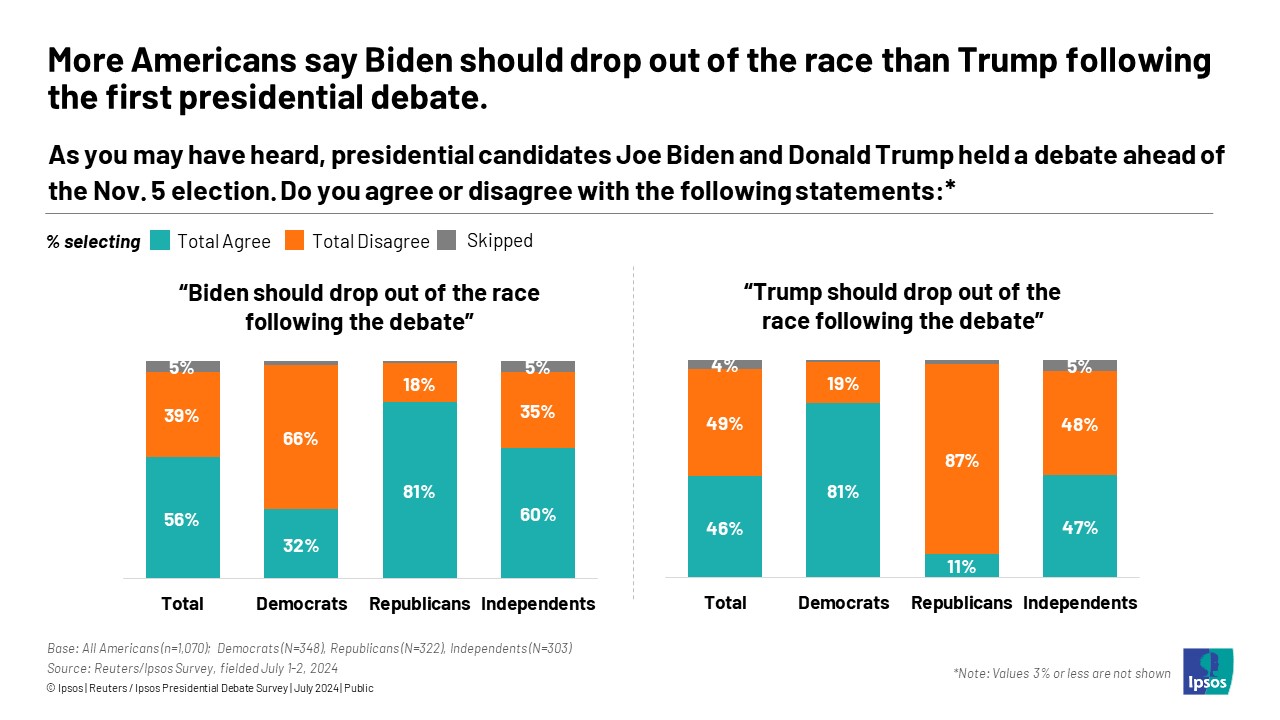Only Michelle Obama bests Trump as an alternative to Biden in 2024
Washington, DC, July 2, 2024—Following the first 2024 presidential debate, President Joe Biden and former President Donald Trump remain in dead heat for November’s election. In hypothetical matchups with Democratic candidates other than Biden, former first lady Michelle Obama is the only hypothetical candidate to definitively defeat Trump in this poll. Michelle Obama also tops the charts in favorability among registered voters, with Trump and Biden trailing her by more than 10 percentage points each. When asked whether Trump or Biden should drop out of the race following the debate, nearly three in five agree for Biden and just under half say the same about Trump.
For more information about this poll, please click here.

Detailed Findings
1. After the debate, Trump and Biden remain tied among registered voters for the November presidential election. In other hypothetical Democratic matchups against Trump, only Michelle Obama bests Trump among registered voters.
- When asked who they would vote for in the November presidential election, 40% of registered voters say Biden and 40% say Trump. This tie between candidates is consistent from late May 2024 when 41% said Biden and 39% said Trump.
- When asked about hypothetical Democratic candidate matches against Trump, 50% of registered voters say they would vote for Michelle Obama, and just 39% say they would vote for Trump.
- All other hypothetical Democratic candidates either perform similarly to or worse than Biden against Trump. Vice President Kamala Harris hypothetically wins 42% of registered voters to Trump’s 43%. California Governor Gavin Newsom hypothetically wins 39% of registered voters to Trump’s 42%. All other hypothetical Democratic candidates earn between 34% to 39% of potential votes among registered voters.
2. Most registered voters have unfavorable opinions of Biden or Trump. Again, only Michelle Obama receives majority favorability among registered voters. Other potential candidates, aside from Vice President Kamala Harris, have lower favorability ratings but also lower name recognition.
- Forty-two percent of registered voters say they have a favorable opinion of Trump, and 38% say the same about Biden. About three in five say they have unfavorable opinions of Trump (56%) or Biden (60%).
- Comparatively, more registered voters, 55%, say they have a favorable opinion of Michelle Obama. Kamala Harris’ favorability generally falls in line with Trump and Biden, as 40% of registered voters say they have a favorable opinion of her.
- Other hypothetical Democratic candidates—California Governor Gavin Newsom, Michigan Governor Gretchen Whitmer, Kentucky Governor Andy Beshear, and Illinois Governor J.B. Pritzker—have significantly lower favorability ratings. However, significantly more registered voters say they have not heard of each of these public figures.

3. More than half of Americans say Biden should drop out of the presidential race following the debate. Just under half say Trump should drop out. A higher share of Democrats say Biden should drop out than Republicans who say Trump should drop out. Differences also emerge by race and ethnicity.
- Nearly three in five (56%) Americans agree Biden should drop out of the race following the debate. Just 46% of Americans say Trump should drop out of the race following the debate, ten percentage points lower than said so for Biden.
- While just 11% of Republicans say Trump should drop out following the debate, about one-third (32%) of Democrats agree Biden should drop out.
- Among independents, 60% say Biden should drop out following the debate, and 47% say Trump should drop out.
- The majority (63%) of white Americans say Biden should drop out, but just 41% say the same about Trump. Conversely, and the majority (67%) of Black Americans say Trump should drop out, but just 31% say Biden should drop out. Meanwhile, about half of Hispanic Americans say Trump or Biden should drop out (51% and 49%, respectively).

About the Study
This Ipsos poll was conducted July 1-2, 2024 on behalf of Reuters using the KnowledgePanel®. This poll is based on a representative sample of 1,070 U.S. residents, age 18 or older. This sample includes 892 registered voters, 348 Democrats, 322 Republicans, and 303 independents.
The study was conducted in English. The data were weighted to adjust for gender by age, race/ethnicity, Census region, metropolitan status, education, household income, and party ID. Party ID benchmarks are from the 2023 NPORS annual survey. The demographic benchmarks came from the 2023 March Supplement of the Current Population Survey (CPS). The weighting categories were as follows:
- Gender (Male, Female) by Age (18-29, 30-44, 45-59, 60+)
- Race-Ethnicity (White/Non-Hispanic, Black/Non-Hispanic, Other/Non-Hispanic and 2+ Races/Non-Hispanic, Hispanic)
- Census Region (Northeast, Midwest, South, West)
- Metropolitan Status (Metro, Non-Metro)
- Education (High School graduate or less, Some College, Bachelor or higher)
- Household Income (under $25K, $25K-$49,999, $50K-$74,999, $75K-$99,999, $100K-$149,999, $150K and over)
- Party ID (Democrat, Lean Democrat, Republican, Lean Republican, Independent/Something else)
The margin of sampling error is plus or minus 3.2 percentage points at the 95% confidence level, for results based on the entire sample of adults. The margin of error takes into account the design effect, which was 1.15 for all adults. The margin of sampling error is plus or minus 3.5 percentage points at the 95% confidence level for registered voters, plus or minus 5.5 percentage points at the 95% confidence level for Democrats, plus or minus 5.7 percentage points at the 95% confidence level for Republicans, and plus or minus 6.1 percentage points at the 95% confidence level for independents. The design effect is 1.12 for registered voters, 1.08 for Democrats, 1.08 for Republicans, and 1.19 for independents.
In our reporting of the findings, percentage points are rounded off to the nearest whole number. As a result, percentages in a given table column may total slightly higher or lower than 100%. In questions that permit multiple responses, columns may total substantially more than 100%, depending on the number of different responses offered by each respondent.
For more information on this news release, please contact:
Chris Jackson
Senior Vice President, US
Public Affairs
+1 202 420-2025
Annaleise Azevedo Lohr
Director, U.S.
Public Affairs
About Ipsos
Ipsos is one of the largest market research and polling companies globally, operating in 90 markets and employing over 18,000 people.
Our passionately curious research professionals, analysts and scientists have built unique multi-specialist capabilities that provide true understanding and powerful insights into the actions, opinions and motivations of citizens, consumers, patients, customers or employees. Our 75 solutions are based on primary data from our surveys, social media monitoring, and qualitative or observational techniques.
Our tagline "Game Changers" sums up our ambition to help our 5,000 customers move confidently through a rapidly changing world.
Founded in France in 1975, Ipsos has been listed on the Euronext Paris since July 1, 1999. The company is part of the SBF 120 and Mid-60 indices and is eligible for the Deferred Settlement Service (SRD).ISIN code FR0000073298, Reuters ISOS.PA, Bloomberg IPS:FP



